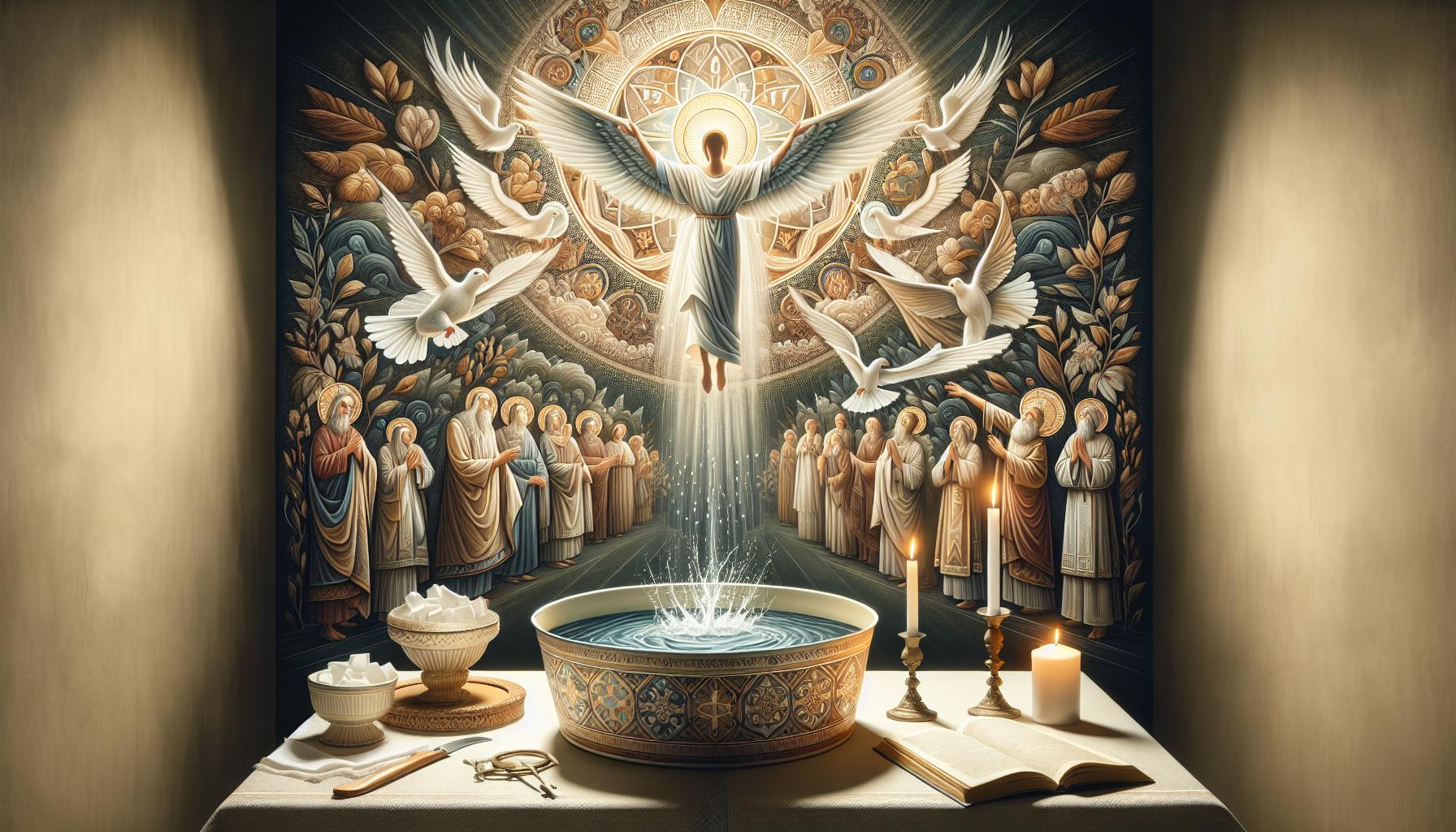What does it truly mean to experience the outpouring of the Holy Spirit in the life of a believer? Understanding the baptism in the Holy Spirit is crucial for anyone seeking a deeper connection with Christ and fellow believers. This sacred moment, which signifies unification with Jesus and the Christian community, unlocks the full blessings of salvation and empowers a transformative faith journey.
Understanding the Essence of Baptism in the Holy Spirit
Understanding the concept of being baptized in the Holy Spirit is fundamental to many Christians, as it signifies a profound transformation and empowerment in their spiritual journey. Contrary to common belief, the baptism of the Holy Spirit is not merely a one-time event but an integral aspect of the Christian life that occurs at the moment of conversion. This initiation into the spiritual life was first made manifest at Pentecost, illustrating that every believer receives the Holy Spirit and shares in this transformative experience upon accepting Jesus Christ [2[2].
The essence of baptism in the Holy Spirit can be understood through several key aspects:
The Role of the Holy Spirit
- Guidance: The Holy Spirit serves as a divine guide, illuminating the path for Christians as they navigate their faith.
- Empowerment: Through this baptism, believers are empowered to live out their faith boldly and effectively, often resulting in spiritual gifts.
- Community: The baptism draws believers into the wider body of Christ, fostering unity among diverse followers of Jesus.
Experiencing the Baptism
For many, the experience of receiving the Holy Spirit is marked by a tangible sense of God’s presence. This can manifest in various ways, including enhanced sensitivity to scripture, a passion for serving others, or even extraordinary manifestations of spiritual gifts. Importantly, these experiences are not uniform; each believer’s encounter is distinct, shaped by their personal relationship with God.
In seeking to understand this baptism more deeply, it can be helpful to reflect on practical steps for engaging with the Holy Spirit. Here are a few suggestions:
- Prayer: Regularly invite the Holy Spirit into your prayer life, asking for guidance and for a deeper relationship.
- Study Scripture: Engage with the Bible actively, looking for the work of the Holy Spirit throughout both the Old and New Testaments.
- Community Engagement: Participate in church groups or discussions focused on spiritual growth, where shared experiences can enhance understanding.
By acknowledging the significance of baptism in the Holy Spirit, believers can embark on a more profound spiritual journey, experiencing the transformative power and meaning that this vital aspect of faith holds. Remember, this baptism is not just a doctrine but an invitation to deeper intimacy with God and a call to walk in the Spirit daily.
The Biblical Foundations: Key Scriptures on Baptism in the Holy Spirit
The concept of baptism in the Holy Spirit is firmly rooted in Scripture, serving as a pivotal moment in the life of a believer. Many Christians find empowerment in the Holy Spirit that transforms their faith journey, leading to a deeper relationship with God and more effective ministry. Recognizing key biblical passages illuminates the significance of this experience, distinguishing it from mere conversion and highlighting its practical impact on daily living.
Key Scriptures
The New Testament provides several crucial references that delineate the experience of baptism in the Holy Spirit. Here are some of the most compelling verses:
- Acts 1:4-5: “While staying with them, he ordered them not to depart from Jerusalem, but to wait for the promise of the Father… For John baptized with water, but you will be baptized with the Holy Spirit not many days from now.” This promise foreshadows the empowerment the apostles would receive.
- Acts 2:1-4: “When the day of Pentecost arrived, they were all together in one place… And they were all filled with the Holy Spirit.” This passage details the inaugural event of the Holy Spirit’s outpouring, marking the birth of the Church.
- 1 Corinthians 12:13: “For in one Spirit we were all baptized into one body.” This verse emphasizes the unifying aspect of the Spirit, showing how baptism integrates believers into the body of Christ.
- Acts 10:44-47: “While Peter was still saying these things, the Holy Spirit fell on all who heard the word.” This account of Cornelius’ household illustrates that the gift of the Holy Spirit is available to all believers, regardless of background.
These passages collectively highlight the transformative power of baptism in the Holy Spirit. Each verse provides insight into how this baptism is not merely a singular event but a continual source of empowerment that fuels believers for service and witness.
Believers seeking a deeper understanding can reflect on these scriptures, integrating them into their prayer life and spiritual practices. Embracing the fullness of what baptism in the Holy Spirit entails can lead to a more dynamic and impactful Christian experience, unlocking the potential for greater community influence and personal transformation in alignment with God’s will.
Experiencing the Transformative Power of the Holy Spirit
The transformative power of the Holy Spirit is a vital experience for many believers and is often described as a profound encounter that leads to a radical change in one’s life. This experience, commonly associated with the concept of baptism in the Holy Spirit, can ignite a new passion for faith and service, providing individuals with divine strength and guidance. Through this powerful encounter, many report feelings of peace, joy, and an overwhelming sense of purpose that transcends ordinary life.
When individuals seek the baptism in the Holy Spirit, they often find themselves being equipped with spiritual gifts that enable them to serve others and deepen their relationship with God. This empowerment might manifest in various ways, such as enhanced understanding of Scripture, courage to share their faith, or the ability to love and forgive in difficult situations. Such transformative experiences are not merely emotional; they are rooted in a genuine spiritual awakening that encourages believers to step out of their comfort zones and embrace a life filled with purpose.
- Enhanced Understanding: The Holy Spirit provides clarity and reveals spiritual truths, making complex biblical concepts accessible.
- Courage to Share: A newfound boldness empowers believers to share their faith stories, transforming lives around them.
- Empowerment to Forgive: Individuals often report an ability to forgive others, freeing themselves from the burden of anger or resentment.
Real-world examples of this transformative power are abundant. For instance, many missionaries attribute their effective outreach to the empowering work of the Holy Spirit. They often speak of moments when they felt an extraordinary guidance or protection during dangerous missions, illustrating how the Holy Spirit can turn fear into fearless action for a greater cause. Furthermore, believers who experience the baptism in the Holy Spirit frequently report a desire to engage more deeply in community service, recognizing their role as agents of love and change in the world.
By seeking and embracing the baptism in the Holy Spirit, individuals can unlock a life of extraordinary possibilities, filled with joy and divine purpose. This not only enhances their personal spiritual journey but also encourages them to become a blessing to others, highlighting the communal aspect of experiencing the Holy Spirit’s transformative power. Ultimately, this journey is about moving beyond theoretical understanding to experiencing the vibrant, life-changing work of the Holy Spirit in everyday life.
The Role of Baptism in Spiritual Growth and Community Life
Baptism serves as a significant rite within many religious traditions, but its role transcends mere ritual to become a powerful catalyst for spiritual growth and communal bonds. Within the context of baptism in the Holy Spirit, believers often find a deeper sense of purpose and connection that enhances their faith journey and strengthens the community around them. This transformative experience not only affirms personal convictions but also fosters a collective identity rooted in shared beliefs.
The Significance of Spiritual Growth Through Baptism
Baptism in the Holy Spirit is often viewed as an enriching experience that empowers individuals to live out their faith more fully. This distinct form of baptism can lead to:
- Spiritual Empowerment: Individuals gain renewed strength and confidence to share their faith and partake in acts of service.
- Deeper Understanding: This baptism encourages a more profound grasp of scriptures and spiritual truths, igniting a passion for personal study and growth.
- Authentic Worship: Participants frequently report enhanced worship experiences, feeling a more profound connection to God during communal gatherings.
These elements not only contribute to personal aspects of faith but also enhance communal interactions, allowing believers to lift each other up in their spiritual pursuits.
Baptism and Community Life
The communal aspect of baptism in the Holy Spirit is equally compelling. It binds members together as they collectively experience the empowerment of the Spirit, creating a supportive environment for fellowship and growth. This community dynamic is characterized by:
- Shared Experiences: Retreats, prayer groups, and study sessions are often framed around the common experience of baptism, allowing sustained spiritual encouragement.
- Active Participation: Members are motivated to engage in ministry and outreach, contributing to a dynamic faith community that reflects the teachings of Christ.
- Cultural Unity: As different backgrounds come together in their shared experience of the Holy Spirit, there exists a unique blending of cultures and traditions that enriches group identity.
These unifying experiences not only deepen relationships within the community but also extend outreach efforts, acting as a beacon of hope and support to those outside their circles.
Embracing the Power of Baptism
To harness the full potential of baptism in the Holy Spirit, individuals and communities are encouraged to:
- Participate regularly in communal worship and events to cultivate deeper relationships.
- Engage in consistent prayer and study focused on understanding the role of the Holy Spirit in their lives.
- Encourage testimonies within the community that reflect personal growth and the transformative power of baptism.
By implementing these practices, believers can draw closer to one another and to God, leading to an enriched spiritual journey that magnifies both personal faith and community vitality.
In summary, baptism in the Holy Spirit not only nurtures personal spiritual growth but also fortifies community life, allowing both believers and their congregations to thrive in a collective pursuit of faith and service.
Common Misunderstandings About Baptism in the Holy Spirit
The concept of baptism in the Holy Spirit can often be surrounded by confusion and misconceptions, leading many to misunderstand its significance and purpose. One prevalent misunderstanding is that baptism in the Holy Spirit is merely a one-time event that guarantees spiritual maturity or status in the church. In reality, while it is indeed a transformative experience that fills believers with power and boldness, it is also part of an ongoing journey of faith and growth. Just as a person continues to nurture and develop their relationship with God through daily practices and community involvement, so too does the work of the Holy Spirit evolve within their lives.
Another common misconception is that the baptism in the Holy Spirit is synonymous with the initial receiving of the Holy Spirit at salvation. According to biblical teachings, such as those found in Matthew 3:11, the baptism in the Holy Spirit serves as an immersion, providing believers not only with strength but also with a deeper connection to both Christ and the community of believers [1[1][3[3]. This is distinct from the moment of salvation, which marks the initial indwelling of the Holy Spirit. Therefore, understanding this differentiation can help believers better grasp the fullness of their spiritual experience and the empowerment available to them.
Believers often think that evidence of having received the baptism in the Holy Spirit must manifest in particular ways, such as speaking in tongues or performing miracles. While these can be valid manifestations of the Spirit’s work, they are not the only indicators of this baptism and should not be viewed as a requirement. The true empowerment from the Holy Spirit comes through a transformed heart and life, characterized by a deeper love for God, increased ability to serve others, and the capacity to overcome sin [2[2]. It is essential for believers to recognize that various gifts and expressions can arise from this baptism, and focusing on love and service is a crucial aspect of its power and meaning.
In summary, dispelling these common misunderstandings can help believers approach the baptism in the Holy Spirit with a more informed and open heart. Seeing it not just as a single moment in time but as a vital part of a comprehensive and ongoing relationship with God enables a richer and more powerful faith journey. Consider engaging in personal study or group discussions about these topics, seeking to deepen your understanding and experience of the Spirit’s work within your life and community, as you explore what baptism in the Holy Spirit truly means for you.
How to Prepare for a Baptism in the Holy Spirit
Preparing for the baptism in the Holy Spirit is a profound journey that involves spiritual readiness, prayerful reflection, and a sincere desire to experience the fullness of God’s presence. This process is not merely an event but a transformative encounter that empowers believers, encouraging them to cultivate a deeper relationship with the Holy Spirit. Embracing this journey requires intentional steps that foster both understanding and openness to the Spirit’s work in your life.
Spiritual Readiness and Reflection
To prepare adequately, it is essential first to engage in self-examination. Ask yourself questions about your current spiritual condition: Are there unconfessed sins or unresolved issues in your life? Reflecting on these aspects can help clear the way for a more receptive heart. Take time to pray and meditate on relevant Scriptures, such as Acts 2:38-39, which speaks of repentance and the promise of the Holy Spirit. This preparation phase cultivates a fertile ground for spiritual growth.
- Spend time in prayer: Seek God’s guidance and ask for the Holy Spirit’s presence in your life.
- Engage with Scripture: Read passages that discuss the Holy Spirit, including John 14:26 and Romans 8:26-27, to enhance your understanding of the Spirit’s role.
- Seek Godly counsel: Connect with a pastor or a spiritually mature mentor who can guide you through your preparation.
Openness to the Spirit’s Work
When approaching the baptism in the Holy Spirit, maintaining an open and expectant heart is crucial. God desires to manifest His power through you, equipping you for service and enabling you to overcome challenges. Embrace the anticipation of receiving gifts from the Spirit, such as boldness, wisdom, and discernment. Journaling your thoughts and prayers during this time can help track your spiritual progress and highlight areas where you sense the Spirit’s prompting.
Additionally, participating in community worship can be beneficial. Surrounding yourself with other believers who are also seeking the baptism can create an encouraging atmosphere of faith. Witnessing their experiences and testimonies can inspire and affirm your journey, reinforcing the collective pursuit of deeper spiritual encounters.
Engage with Community
Being part of a community that values the work of the Holy Spirit is vital. Engage in small groups or prayer circles focused on discussing the Holy Spirit’s influence in life. Sharing experiences and expectations can enhance your understanding and expectation of what it means to be baptized in the Holy Spirit.
- Join a prayer group: Be part of a community that seeks the baptism in the Holy Spirit collectively.
- Attend relevant workshops or seminars: This can increase your understanding and expectations of the baptism experience.
- Participate in Bible studies: Focus on the books of Acts or other passages related to the gifts and workings of the Holy Spirit.
By taking these steps, you can uniquely position yourself to embrace the baptism in the Holy Spirit fully, aligning your life with God’s transformative power. As understanding grows and the heart opens, the experience can lead to a renewed sense of purpose and divine empowerment, fulfilling the profound meaning behind being baptized in the Holy Spirit.
Embracing the Gifts of the Spirit: Moving Beyond Baptism
As believers embark on their spiritual journey, the initial experience of baptism in the Holy Spirit serves as a pivotal moment marked by union with Christ and fellow Christians. However, this transformative event is merely the beginning of a deeper, ongoing relationship with the Holy Spirit, which invites believers to fully embrace the array of gifts that the Spirit provides. Recognizing and cultivating these gifts is crucial for spiritual growth and effective service within the body of Christ.
To truly harness the gifts of the Spirit, one must first understand their diversity and purpose. The Holy Spirit distributes various spiritual gifts among believers, as indicated in passages like 1 Corinthians 12. These gifts include wisdom, knowledge, faith, healing, miracles, prophecy, discernment, speaking in tongues, and interpretation of tongues. Embracing these gifts involves a willingness to serve and engage actively within the Christian community.
Identifying Your Spiritual Gifts
Identifying and nurturing these gifts can be an enlightening process. Here are some practical steps to discern and develop your spiritual gifts:
- Pray for Guidance: Seek the Holy Spirit’s direction in your life and ask for clarity regarding your unique spiritual gifts.
- Participate in Community: Engage in church activities and volunteer opportunities to see where your inclinations and abilities align.
- Consult Others: Talk to fellow church members or leaders who can provide insight into what gifts they observe in you.
- Take a Spiritual Gifts Assessment: Consider using tools or quizzes specifically designed to identify spiritual gifts based on biblical principles.
Practicing the Gifts
Once you identify your gifts, the next step is to put them into practice. This not only benefits you personally but also strengthens the entire church body. For instance, someone with the gift of teaching can lead Bible studies, while someone with the gift of hospitality might organize events that foster community spirit. The key is to act with faith and intention, trusting that the Holy Spirit empowers your efforts.
In essence, moving beyond the baptism in the Holy Spirit into the realm of actively utilizing spiritual gifts leads to a richer, more impactful Christian experience. By embracing these gifts, believers not only deepen their personal relationship with the Spirit but also contribute to the growth and vitality of their church community, embodying the very essence of what it means to live in the power of the Holy Spirit.
Navigating Diverse Perspectives on Baptism Across Denominations
Understanding the various views on baptism is crucial for those exploring its spiritual significance. Across the Christian landscape, baptism is not merely a practice; it embodies a spectrum of interpretations and theological implications that can vary significantly among different denominations. This diversity invites a deeper understanding of how baptism relates to the Holy Spirit, revealing its multifaceted power and meaning.
Varied Interpretations of Baptism
One of the most profound areas of divergence lies in how different denominations define the act of baptism itself. For instance, baptism in water is viewed as a public declaration of faith in many Protestant communities, emphasizing the individual’s personal relationship with Christ. In contrast, Catholic and Orthodox traditions hold baptism as a sacrament essential for salvation, signifying the washing away of original sin and entrance into the faith community.
The role of the Holy Spirit in baptism also varies widely:
- Protestant Denominations: Many emphasize a personal experience of the Holy Spirit following baptism, often connected to a believer’s conversion.
- Catholic and Orthodox Churches: These traditions emphasize that the Holy Spirit is conferred during baptism, instilling grace from the moment of the rite.
- Evangelical Perspectives: Some evangelicals may focus on baptism as a passionate response to an encounter with the Holy Spirit, often with an emphasis on subsequent “baptism in the Holy Spirit” as a distinct experience.
The Symbolism and Power of Baptism
Regardless of the theological backdrop, baptism is universally recognized as a significant spiritual milestone. It symbolizes initiation, transformation, and incorporation into the body of Christ. For many, understanding what baptism in the Holy Spirit entails is essential for grasping its broader implications.
The following table outlines key differences in baptismal beliefs across several denominations:
| Denomination | Baptism’s Role | Relationship with the Holy Spirit |
|---|---|---|
| Protestant | Public profession of faith | Experience of Holy Spirit post-baptism |
| Catholic | Sacrament for salvation | Holy Spirit conferred during baptism |
| Orthodox | Essential sacrament | Grace instilled at baptism |
| Evangelical | Symbol of faith commitment | Focus on subsequent Holy Spirit baptism |
As you explore these varied perspectives, consider engaging in conversations within your community or church about their understanding of baptism. Each viewpoint offers valuable insights into how believers experience and interpret the work of the Holy Spirit through this sacred rite, enhancing your overall grasp of its profound power and significance.
FAQ
What Is Baptism in the Holy Spirit?
Baptism in the Holy Spirit refers to a profound spiritual experience where believers receive empowerment from the Holy Spirit. This transformative event is often associated with a deeper relationship with God and the manifestation of spiritual gifts, fostering greater ministry effectiveness.
This concept is rooted in various parts of the Bible, particularly in the New Testament, where Jesus promises the coming of the Holy Spirit to His followers. Many Christians believe that this experience is essential for living a spiritually fruitful life and helps individuals connect with God on a deeper level.
Why Does Baptism in the Holy Spirit Matter?
Baptism in the Holy Spirit is significant because it enhances the believer’s relationship with God and equips them for service. This empowerment can lead to *greater confidence*, *spiritual growth*, and the ability to exercise spiritual gifts such as prophecy or healing.
Furthermore, this experience often brings about a renewed sense of purpose and vigor for sharing one’s faith with others. Many argue that, without this baptism, a believer may miss out on experiencing God’s fullness and might find difficulty in their spiritual journey.
How Can I Experience Baptism in the Holy Spirit?
Experiencing baptism in the Holy Spirit often involves prayer, a desire for spiritual growth, and openness to God’s leading. Engaging in personal and communal worship—along with seeking guidance from church leaders—can facilitate this experience.
It’s essential to ask God sincerely for this gift while remaining attentive to His presence. Many find that participating in a *spirit-filled* community encourages this transformative journey. For more on preparing your heart, check out our detailed article on [spiritual readiness](#).
What Are the Signs of Baptism in the Holy Spirit?
Common signs of baptism in the Holy Spirit include speaking in tongues, increased boldness in faith, and a greater sensitivity to God’s voice. These manifestations serve as evidence of the Spirit’s work in one’s life.
In addition, believers may notice an enhancement in their existing gifts or the emergence of new spiritual gifts. Each individual’s experience can vary, emphasizing a personalized relationship with the Holy Spirit and His unique work within each person’s heart.
Can Baptism in the Holy Spirit Happen More Than Once?
While baptism in the Holy Spirit is often viewed as a distinct event, many believe that believers can experience *subsequent fillings* or renewals of the Holy Spirit throughout their lives. These occasions can happen during special worship events, personal prayer, or moments of spiritual awakening.
Such renewals provide ongoing empowerment and invite believers to *deepen their relationship* with God. This understanding encourages continual openness to the Holy Spirit’s influence in everyday life.
Why Is There Controversy Surrounding Baptism in the Holy Spirit?
Controversy surrounding baptism in the Holy Spirit often stems from differing theological views among Christian denominations. Some believe that this baptism is an essential experience following salvation, while others view it as a metaphorical understanding of living a Spirit-filled life.
This diversity creates discussions about the *role of the Holy Spirit*, spiritual gifts, and how they manifest in today’s church. Open dialogue and understanding are essential in navigating these differences while appreciating various traditions.
How Does Baptism in the Holy Spirit Affect Daily Life?
Baptism in the Holy Spirit can significantly impact daily life by fostering greater peace, purpose, and joy. Those who undergo this experience often report feeling more equipped to face challenges and exhibit a stronger desire to share their faith with others.
This empowerment also nurtures spiritual disciplines, such as prayer and studying the Bible, leading to *deeper insights* and a more vibrant faith. Ultimately, individuals often feel a renewed commitment to living out their beliefs authentically.
To Conclude
In conclusion, baptism in the Holy Spirit is a profound and transformative experience that unites believers with Christ and empowers them for a life of faith and service. This sacred event signifies not just a personal connection to divine grace but also marks the beginning of a believer’s journey into the fullness of spiritual life, filled with strength, boldness, and the assurance of God’s presence. As you reflect on the theological implications and practical applications of this significant rite, consider how it can enrich your own spiritual walk and community life. We encourage you to delve deeper into the scriptures and teachings surrounding this essential doctrine, fostering further engagement in your ministry and personal faith. Whether you come from a traditional or contemporary background, the call to understand and embrace the baptism of the Holy Spirit is an invitation to explore the depths of God’s love and the transformative power available to all who seek it.






